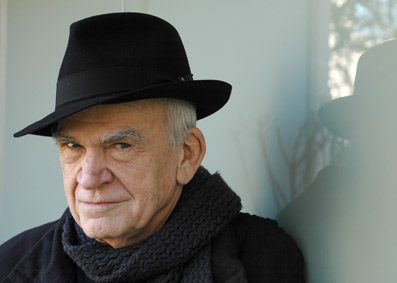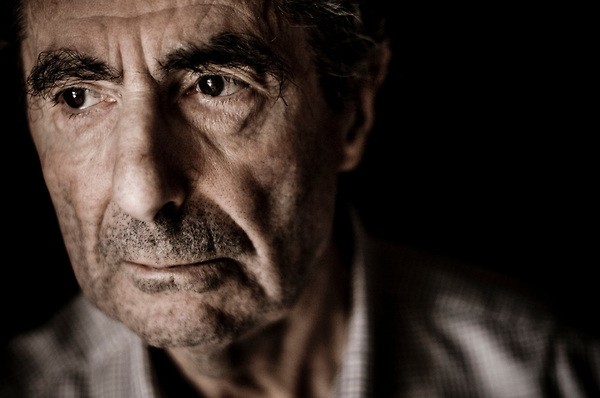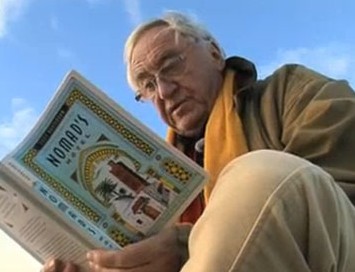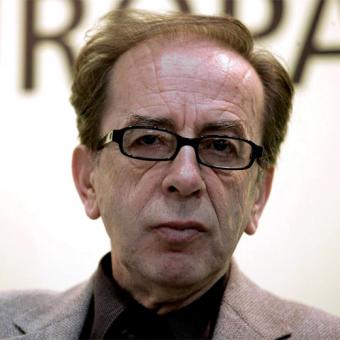Strange. I can’t shake the feeling that when the Nobel literature committee sends white smoke up its chimney on Thursday, it will smell like pepernoten and Cees Nooteboom will have a very busy day. While not my first choice, this Dutch author, widely known in Europe for his poetry and travel writing, and in the United States for the few of his short, brilliant, philosophically disarming novels available in English, would cut a distinguished, charming, and very apt figure on Stockholm’s stage, come December. His win would also net The Netherlands its first Nobel laurels for literature.
Unless, that is, the committee decides its time to bring another non-European into the fold. China’s Mo Yan, perhaps. What a delight it would be if they pulled a fast one and gave it to Ludmilla Petrushevskaya, Russia’s wicked wise novelist, short story writer, playwright, and cabaret artist. Amos Oz will almost certainly have to wait for some other October to arrive with his moment, unless Stockholm wishes to make overt its often implicit, always coyly denied political motivations. And is it just me, or does the neglect of Chinua Achebe seem unwarranted? I read in David Marr’s biography of Patrick White that the ground-breaking Nigerian writer was on the shortlist as far back as 1973. What happened there? Ladbrokes, Britain’s famous betting company, has Haruki Murakami as the favorite. I don’t see it myself. Perhaps another year. And that Bob Dylan buisness? Cute, but really, that’s enough of that.
So, here is my personal short list: Normally I could yap away all day long about these writers. But My partner, Sam – who seduced me, in part, with books – is gravely ill and in the hospital. Which means I have had neither the time nor the reserves to write cogently the rationale behind my choices. So these five magnificent writers will have to speak for themselves – better, by far, it turns out, than I ever could.
Once, and then for good, the spell had been broken. As the chalice was being lifted to where, high above the church, the sun would soon trace its course, the old man suddenly began to tremble. Inni would never forget the scream that followed, never. The raised hands let go of the chalice. The wine, the blood, poured all over his chasuble, and the cloth was torn from the alter in one haul by the monk’s clawing hands, dragging candles, host, and paten with it. A scream as of a huge wounded animal bounced back from the stone walls. The man tugged at his chasuble as though he was trying to tear it asunder, and then, still screaming, he slowly began to fall. His head hit the chalice and started to bleed. When he was already dead, he still went on bleeding, red and red mingled on the islands of shiny silk amid the gold brocade, and it was no longer clear which was which — the wine had become blood, the blood wine.
– from Rituals
It must have been snowing…there…. Then he stopped writing, snatching away the pen as if afraid it might be held to the paper by magic. It was with an effort that he went on to record, in the succinct style used in the rest of the rest of the Chronicle, the death of Kurt and his own appointment as head of the Palace of Dreams. Then his pen was still again, and he thought of the distant ancestor called Gjon who on a winter’s day several centuries before had built a bridge and at the same time edified his name. The patronymic bore within it, like a secret message, the destiny of the Quprilis for generation after generation. And so that the bridge might endure, a man was sacrificed in its building, walled up in its foundations. And although so much time had gone by since, the traces of his blood had come down to the present generation. So that the Quprilis might endure…
Perhaps that was why — like the ancient Greeks, cutting off their hair at a funeral so that the angry soul of the departed wouldn’t be able to recognize them and do them harm — perhaps that was why the Quprilis had changed their name to Köprülü: to avoid being identified with the bridge.
Mark-Alem knew all this, but remembered how on the fateful night he had longed to throw off the protective mask, the Islamic half-shield of “Alem,” and adopt one of those ancient names that attract danger and were marked by fate.
– from The Palace of Dreams
 3. Milan Kundera (France/Czech Republic)
3. Milan Kundera (France/Czech Republic)
What remains of the dying population of Cambodia?
One large photograph of an American actress holding an Asian child in her arms.
What remains of Tomas?
An inscription reading HE WANTED THE KINGDOM OF GOD ON EARTH.
What remains of Beethoven?
A frown, and improbable mane, and a somber voice intoning “Es muss sein!”
What remains of Franz?
An inscription reading A RETURN AFTER LONG WANDERINGS.
And so on and so forth. Before we are forgotten, we will be turned into kitsch. Kitsch is the stopover between being and oblivion.
– from The Unbearable Lightness of Being
Savanna has fallen asleep, her lips slack around the nipple. With the boys out of the way, it’s easier to detach her. Sally can burp her, settle her on her blanket, without worrying about an exposed breast. If Alex finds the sight distasteful — she knows he does, he dislikes the whole conjunction of sex and nourishment, his wife’s breast turned into udders — he can look away, and he does.
As she buttons herself up there comes a cry, not sharp but lost, diminishing, and Alex is on his feet before she is, running along the path. Then a louder cry getting closer. It’s Peter.
“Kent falled in. Kent falled in.”
His father yells, “I’m coming.”
Sally will always believe that she knew at once, even before she heard Peter’s voice she knew what had happened. If any accident happened it would not be to her six-year-old who was brave but not inventive, not a show-off. It would be to Kent. She could see exactly how. Peeing into the hole, balancing on the rim, teasing Peter, teasing himself.
– from Deep-Holes, collected in Too Much Happiness
 1. Philip Roth (United States)
1. Philip Roth (United States)
What happens when people die, my mother explained, is that they go up to the sky and live on forever as gleaming stars….
That explanation made sense then and, of all things, it made sense again on the night when, wide awake from the stimulus of all that narrative engorgement, I lay out of doors till dawn, thinking that Ira was dead, that Eve was dead, that with the exception perhaps of Sylphid off in her villa on the French Riviera, a rich old woman of seventy-two, all the people with a role in Murray’s account of the Iron Man’s unmaking were now no longer impaled on their moment but dead and free of the traps set for them by their era. Neither the ideas of their era nor the expectations of our species were determining destiny: hydrogen alone was determining destiny. There are no longer mistakes for Eve or Ira to make. There is no betrayal. There is no idealism. There are no falsehoods. There is no class struggle. There is no discrimination or lynching or Jim Crow, nor has there ever been. There is no injustice, nor is there justice. There are no utopias. There are no shovels. Contrary to the folklore, except for the constellation Lyra —which happened to perch high in the eastern sky a little west of the Milky Way and southeast of the two Dippers — there are no harps. There is just the furnace of Ira and the furnace of Eve burning at twenty million degrees.
– from I Married a Communist
Well then, until tomorrow…



